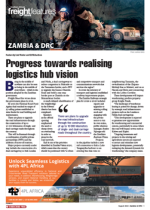Turners Shipping was recently appointed as an authorised agent of the OGEFREM, allowing the company to process and issue FERI Certificates for imports into and through the DRC.The purpose of the FERI Certificate is to facilitate customs clearance and compliance, while it’s also crucial for tracking and managing cargo destined for the DRC.“We are pleased with the agency appointment as it adds another service to our offering as we look to adapt to changes in the logistics industry,” says Gregory Marks, national business development and transformation manager at Turners Shipping.“Doing business in countries in sub-Saharan Africa is not without its challenges, but despite the challenges there are still immense opportunities,” he says. “Currently, Zambia and the DRC are enjoying infrastructure development and the economic growth associated with capital investment.”Both their economies are hinged on mining exports. Copper and associated products feature strongly in the two countries, while the DRC also exports cobalt and diamonds.“These industries are demanding on equipment, and replacement parts and upgrades are an ongoing process. In addition to heavy equipment, both countries are reliant on imports for consumer goods, foodstuffs, processed foods, household products, and electronic equipment.”According to a World Bank report, in 2023, Zambia's imports from South Africa were valued at approximately $2.61 billion. This made South Africa Zambia's largest trading partner, accounting for a significant share of the country's total imports, which included foodstuffs, machinery, consumer products, and other industrial supplies.In the same period, the DRC imported goods worth approximately $121 million from South Africa.There are challenges for logistics managers, among them poor infrastructure, congestion at ports of entry, and bureaucracy with no standardisation.Limited warehousing facilities and insufficient digital infrastructure can also hinder efficient logistics management. Environmental factors include challenging geography, extreme weather conditions, supply chain disruptions, and economic volatility. A shortage of skilled professionals and drivers, labour laws, financial constraints, regulatory compliance, regional variations, and integration with regional markets are additional challenges.“These issues increase the cost of moving goods, but demand outstrips the inconveniences,” says Marks.

